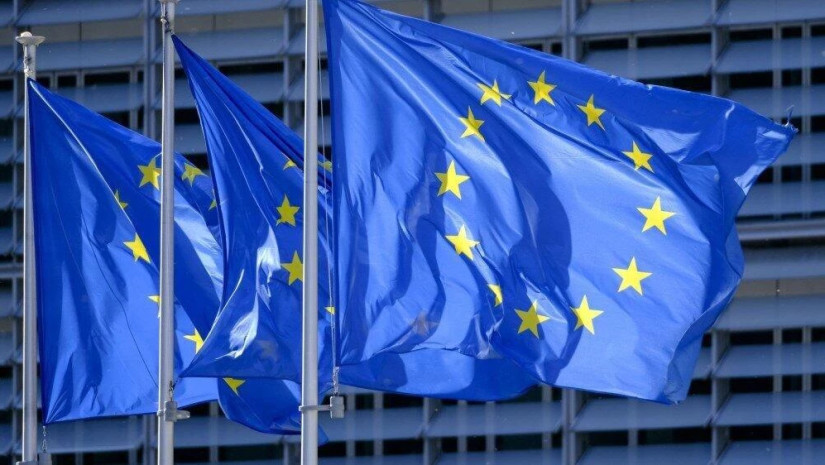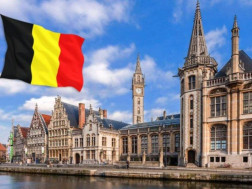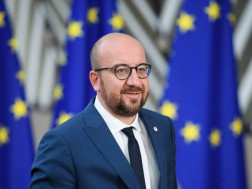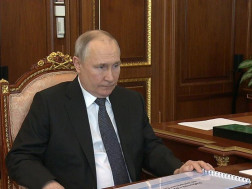The European Union is studying the feasibility of using billions of euros worth of Russian central bank assets already frozen by member states to help with Ukraine’s reconstruction efforts, according to people familiar with the matter.
The discussions are at an early stage and legal experts have been recently tasked to look into possible options, the people said, asking not to be identified discussing confidential matters. Assessing whether or how to take control of the assets is extremely complex and potentially legally fraught.
But as Russia’s invasion of Ukraine drags into its ninth month and rounds of sanctions fail to deter President Vladimir Putin, even as they damage his economy, the EU executive in Brussels is exploring ways to permanently cut off his access to these funds.
The options would focus on how to eventually seize some of the about $300 billion of the Central Bank of Russia’s reserves that were frozen by the EU, the US and other allies following Russia’s invasion of Ukraine. Any EU action would focus on assets held in Europe, the people said. It is unclear precisely what assets have been frozen in the EU.
The issue has been raised with the US, two of the people said, but it is unclear if the Biden administration would also take steps to seize Russian reserves held in dollars. In May, Treasury officials expressed concern about setting a precedent that would discourage other foreign central banks from parking their assets in the US. Confiscating central bank assets would be a legal minefield and the road from an options paper to one day becoming reality is a long one.
The European Commission is “exploring how to make Russia pay for the destruction it caused” and it’s been asked by EU leaders “to present options for using frozen assets for the reconstruction of Ukraine, in line with EU and international law,” said spokesman Christian Wigand, adding that “work is underway.”
Not Permissible
A US Treasury Department spokesperson declined to comment.
Treasury Secretary Janet Yellen said in May she believed such a move is “not something legally permissible in the United States” but that “it’s very natural that given the enormous destruction in Ukraine, and huge rebuilding costs that they will face, that we will look to Russia to help pay at least a portion of the price that will be involved.”
The Treasury Department at the time expressed concern about setting a precedent that would discourage other countries from parking their central bank assets in the US.
The Kremlin has denounced the freezing of the reserves as illegal and said it would fight any effort to seize them for other purposes. “We’re talking about an international act of thievery, in violation of everything,” spokesman Dmitry Peskov said on Oct. 31.
Guarantee Option
The EU’s justice commissioner Didier Reynders told German media group Funke, including the Westdeutsche Allgemeine Zeitung newspaper, on Saturday that the frozen reserves could be kept as a guarantee until Russia voluntarily participates in the reconstruction of Ukraine.
The EU’s executive arm said in May that member states had reported the freezing of about €23 billion of assets of the Russian central bank. One of the people said that figure has since grown but didn’t disclose a precise amount as it is still being assessed.
Legal experts are cautiously trying to analyze the situation and see what could be feasible, one of the people said. Any proposals would need to be legally robust and also backed by member states. Any move to confiscate the central bank’s assets would be very significant and some members could be reluctant to back it. If measures are agreed and implemented, however, seized assets could be used to contribute to Ukraine’s postwar reconstruction costs.
‘Compensation Mechanism’
The Ukrainian government has been calling for months to transfer frozen Russian assets to its accounts as compensation to use in rebuilding the war-torn country. The cost of reconstruction is estimated at $750 billion, Prime Minister Denys Shmyhal said in September.
“We are working on this - so that the appropriate resolution on the implementation of an international compensation mechanism is supported by the United Nations,” Ukrainian President Volodymyr Zelenskiy said on Oct. 20. “Many countries are already willing to do this. I think that by the end of this year we will have real solutions, we will see a real mechanism.”
Separately, the EU has been looking at powers to seize the assets of sanctioned Russians by extending the list of crimes, such as money-laundering and corruption, to include the violation of EU sanctions.
Current rules have been hampering more far-reaching efforts across the bloc to go beyond freezing assets. Sanctioned assets are currently frozen and therefore cannot be used as the idea is that one day they may be returned if restrictions are dropped. To be able to seize and use assets, the EU needs a legal basis to do so.
The bloc is also weighing handing new powers to its fledgling public prosecutor’s office, Bloomberg previously reported. Those powers would be conditional on the plans to make sanctions evasion a crime under EU law.
EU nations have so far frozen about 17.5 billion euros of assets belonging to sanctioned Russian individuals and entities, Bloomberg reports.

















